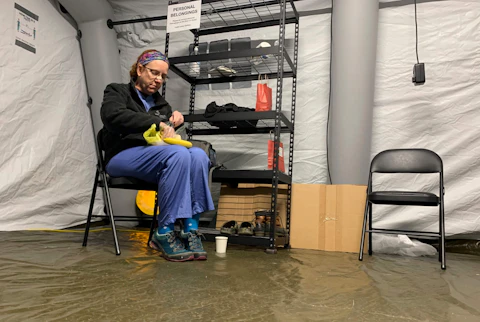North Carolina is one of 29 states that tax menstrual products but there’s a push to repeal this “pink tax” that women largely pay for these essential items.
If you menstruate, you’re paying North Carolina to do it.
That’s because North Carolina considers tampons, pads, and menstrual cups luxury items and, therefore, sticks a state sales tax on it.
We’re one of 29 states that taxes these “non-essential” products as they’re classified under the state tax code. North Carolina’s state sales tax is 4.75%, but can go up to 7.5% in some cities.
“This tax is discriminatory,” said state Rep. Julie von Haefen, an Apex Democrat. “We’re only taxing half the population with these products. Males don’t have to buy them and we’re forced to buy them.”
Von Haefen wants to see North Carolina ditch its period tax, so she introduced a bill in the state legislature that would stop considering tampons and sanitary pads luxury items. The national advocacy group Period Equity is pushing states to change their laws, and nine states have dropped the sales tax on menstrual products since 2015. (California has temporarily made the products tax-free.)
The amount tampon taxes add annually to North Carolina’s tax revenue is minimal – an estimated $8.1 million in state and local taxes, or less than 0.01% of the state’s total revenue, according to Period Equity and the legislature’s fiscal research division. She believes it’s a bipartisan issue, and that both Democrats and Republicans can find common ground on nixing the tax.
For too many, menstrual products are unaffordable to begin with and cause what’s referred to as “period poverty.” A 2019 study found more than one in five women can’t afford menstrual hygiene products each month, while another study found a quarter of teenage girls skipped school because they didn’t have access to them. Period products are also not covered by government assistance programs like WIC and SNAP.
“It really wouldn’t make a big difference to our bottom line in our state budget, but it would make a big difference to the lives of people who struggle to buy these products,” von Haefen said.
There’s also pending legislation in the state Senate that would give $250,000 to NC public school districts to distribute menstrual products to those that need it. That way, girls wouldn’t be compelled to skip school solely because their families can’t afford to buy the products they need during their monthly periods.
If you feel strongly about these measures, then talk to your statement representatives about it, von Haefen said. You can look up who represents you here.
Editor’s note: This version has been corrected from the original to reflect that an estimated $8.1 million from menstrual products are collected each year in state sales tax.





